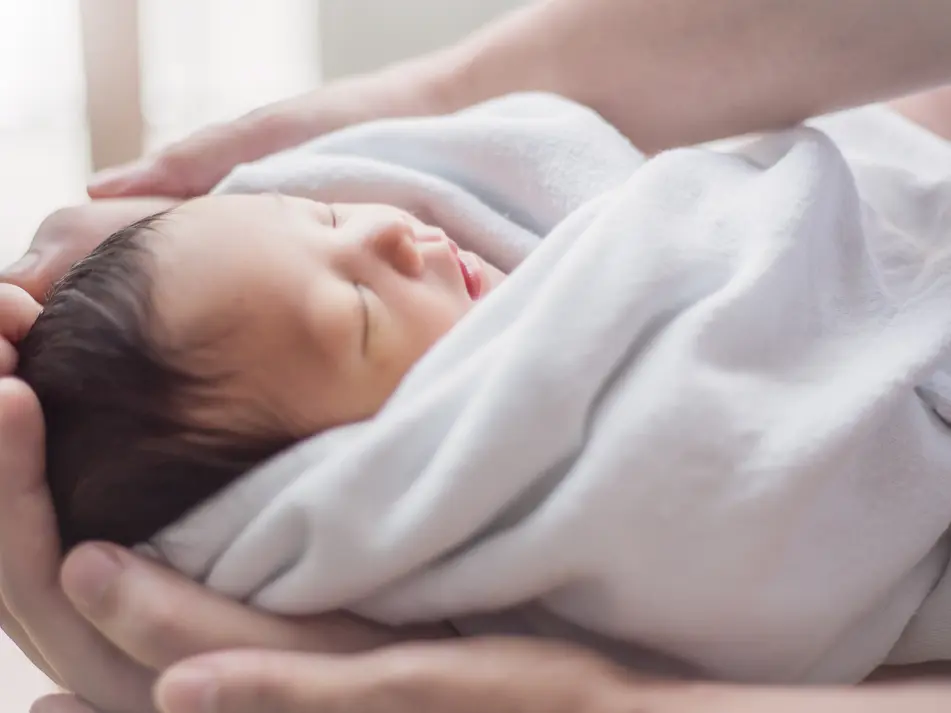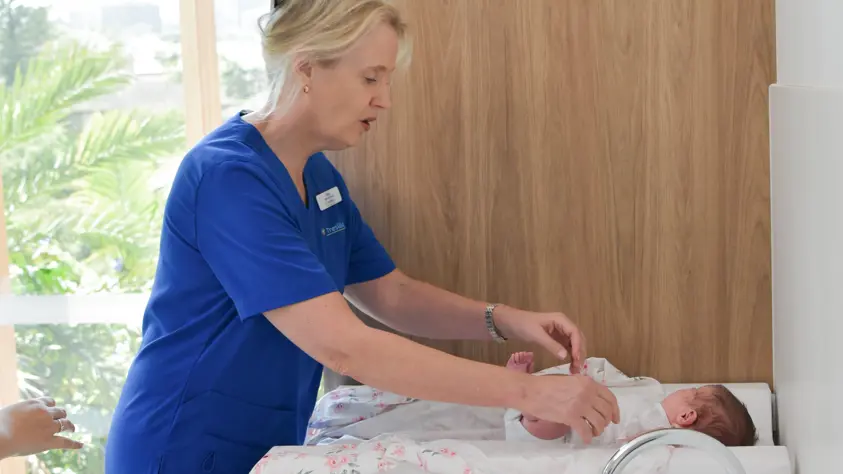Newborn Sleep

On this page
- How much sleep do newborns need?
- What are my newborn's tired signs?
- An example of a Newborn to 6 week old sleep schedule
- An example of a 6 to 12 week old sleep schedule
- How to put a newborn to sleep in the first few weeks
- Will wrapping help to settle my baby?
- Hands-on Settling
- Baby Safety (SIDS Guidelines)
- Newborn Sleep FAQ's
How much sleep do newborns need?
Newborn sleep patterns vary however most babies at this age sleep 14 - 17 hours in a 24 hour period. Usually this is broken up into 6 to 8 periods of sleep, lasting from 2 to 4 hours each.
Newborns have short and sometimes frequent periods of wakefulness for a feed, short socialisation or resettle. The day-night pattern emerges by about 4 weeks old.
What are my newborn's tired signs
When babies are tired, they might yawn, frown, get fussy, or rub their eyes, among other signs. Addressing these signs quickly helps calm the baby and makes it easier for them to sleep.
An example of a Newborn to 6 week old sleep schedule
Night time sleep: Over this period, your baby will have 6 - 8 regularly occurring periods of sleep, lasting 2 - 4 hours each, around the clock. By 4 weeks, their day-night pattern emerges.
Daytime naps: 6 - 8 periods of sleep (2 - 4 hours each) around the clock.
Newborn to 6 week wake window: 1 to 2 hours.
Feeding: Every 2 -3 hours.
An example of a 6 to 12 week old sleep schedule
Night time sleep: 1 period of sustained sleep of 4 to 5 hours during which your newborn might self-settle. They will still wake briefly 1 - 3 times during this longer stretch. By 12 weeks, your newborn will have a day-night pattern.
Daytime naps: 3 to 4 daytime naps (1 - 3 hours each)
6 to 12 week wake window: 1 - 2.5 hours.
Feeding: Every 2 - 4 hours.
How to put a newborn to sleep in the first few weeks
-
1
First, make sure your baby has a dry nappy and has been fed.
-
2
Try holding your baby in your arms until they fall asleep or become drowsy.
-
3
Use gentle rhythmic patting, rocking and soft singing before putting your baby into the cot.
-
4
If they're struggling to settle, using rhythmic movement such as slow rocking, walking with them in a sling or with the pram.
-
5
Try a “top up” breastfeed within 30 minutes of the last feed.
-
6
If your baby wakes after a baby sleep cycle, you may need to re-settle.
Will wrapping help to settle my baby?
Yes it often will. Use a light material such as cotton and make sure your baby's arms are above waist level and their legs are able to bend at the hips with knees apart.
Make sure your baby is not over dressed and their head is uncovered. Stop wrapping your baby when they're starting to show signs of beginning to roll over.

Hands-on Settling
-
1
Talk quietly and cuddle your baby to make sure they're calm.
-
2
Put your baby on their back in the cot awake but calm/drowsy.
-
3
Comfort your baby with gentle ‘ssshhh’ sounds, gentle rhythmic patting, rocking, or stroking until baby is calm or asleep.
-
4
If your baby becomes distressed, pick them up for a cuddle until they're calm or asleep before putting them back in the cot.
-
5
Stay with your baby until they're asleep.
Baby Safety (SIDS Guidelines)
Baby safe sleep is very important. Here are some tips for settling your baby safely:
- Place your baby on their back to sleep.
- Your baby should have their own cot that meets the Australian safety standard and has a firm, well fitted mattress.
- Sleep your baby in your bedroom at night for the first six to 12 months of life.
- Do not let your baby sleep on the couch or an armchair, especially with another person.
- Make sure your baby's head and face cannot become covered while sleeping to prevent suffocation or overheating. Tuck in sheets and blankets or use a safe infant sleeping bag. Do not use a doona, cot bumper, mattress padding, sheep skin or leave soft toys in the cot.
- Dress your baby to be comfortably warm but not hot, to avoid overheating.
- Breastfeed your baby for the first six months where possible.
- Don't smoke during pregnancy or after your child is born and don't allow anyone to smoke near your baby.
- Make sure anyone who looks after your baby understands these safe sleeping recommendations.
Newborn Sleep FAQ's
At 4-6 weeks of age, this is normal behaviour. Babies need to be physically close to their parents and some need help going to sleep or re-settling.
Comforting with cuddles is the best way to settle your baby when he is crying. Wrapping can also help – use a light material such as cotton making sure that the arms are above waist level and there is room to move the legs.
Also check how you are feeding your baby and whether or not there is a link between how the baby is feeding (i.e. fast or gulping or snacking) and his unsettled behaviour.
Unfortunately nothing! This stage of sleep is called “active sleep”, but is when a baby is easier to wake, which is good to be aware of if you have been advised to wake your baby to feed for example with a premature baby, who requires more frequent feeding and tends to sleep more frequently. They will be more likely to feed more successfully when woken during active sleep, than during quiet sleep
This is a common concern for many new parents. Being unsettled and crying are very normal behaviours for newborn babies and part of their development during this time. Things usually improve after baby is around three months.
We suggest you offer lots of hands on support like patting, body rocking and a soothing voice. Going out for a walk in the pram or drive in a car can be helpful.
his is a time to get support from partner, family and friends as these methods take up a lot of energy and can be very exhausting.
A new baby in the family can cause lots of change in the household especially for an older sibling. It can take up to 6 months for older children to adjust to a new baby. Being mindful of the adjustments your older child needs to make to a new baby in the household and demands on your time, is helpful. If possible involve your older child with caring for the new baby and there are lots of ways you can do this (i.e. at nappy change time, bathing time etc.). Set limits and be clear about boundaries with the older child.
Crying it out seems to be the new name to describe ‘controlled crying’ which was a popular teaching to sleep method used in the 1980's. But since then new research about infant mental health has shown that there are more gentler and effective ways to support good sleep behaviours. Tresillian uses an evidenced based method called responsive settling where we encourage parents to gently practice the skills for independent sleep with their baby by soothing baby if they get distressed. Many parents find this approach much easier to use and less stressful as baby does not have to cry for prolonged periods.







































